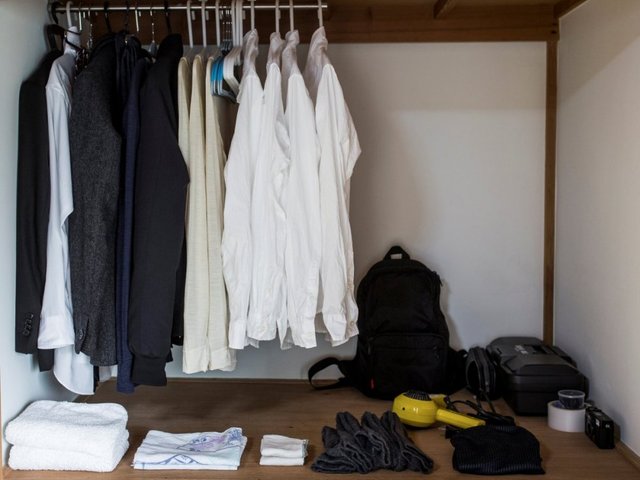Minimalism as a Medicine From Choice

image source
Minimalism is an old phenomenon. Actually, before the global industrial revolution most of people were forced to live in conditions of minimalism. They just hadn't the opportunity to buy something unnecessary, as today we do, becoming greedy consumers in the era of capitalism and unlimited production. Conscious minimalism is a feature of Asia, where rich and poor have always sought to reduce dependence on material things.
Nowadays minimalism has become a life philosophy for many people. It is a symbol of freedom from unnecessary things, desires, dependencies, issues. This is largely due to the desire to relieve our lives somehow, you will not have unnecessary things, your brain will not be overloaded with useless information, you will be able to be mobile and focus on what really matters.
The paralyzing choice.
Minimalism really works In the case of reducing the load on the brain. We constantly make decisions about what to buy, what to say, where to go, what to do. American psychologist Barry Schwartz found the paradox of freedom of choice. According to his research, our brain can work optimally with 4-6 objects for choice (whether it's buying, or the selection of the candidate when voting, or the choice of a movie). With a large number of objects we lose the freedom of choice.

image source
A huge selection of identical objects, which gives us the world today, causes negative effects: it kills the choice, with a large number of objects our brain becomes like paralyzed and we lose rationality. And even if we manage to overcome paralysis and choose, in the end, we remain unsatisfied, than if we had less options to choose. This leads to stress, neurosis and even depression. Because we don't have full information about all the proposed options, the more variants we have, the more effort must be expended to make sense of them.
One of the experiments conducted by Schwartz: In the first case of marketing-promotions he put on a sample of 6 varieties of jam, in the second case – 24. It seems that in the 2 option will be more people who buy jam, but it turns out quite the contrary. With 6 varieties 30% of people made the purchase. With 24 options, only 3% bought jam, they chose a lot longer and looked not so happy after a survey than the first group. That's the paradox. You can find more interesting examples in his book: The Paradox of Choice

image source
Accordingly, reducing the number of things you reduce the number of choices between them, thereby reducing the amount of decisions every day and leaving a fresh brain to make important decisions.
For example: Steve Jobs used this technique actively. That's why he always wore the same clothes, even on the presentation. In many interviews he emphasized it saves him from having to think in the morning what to wear today. And he had habit like this in many other issues .
Starting to apply minimalism to domestic issues, reducing the number of things you thereby trigger a series of sequences that, in General, reconstruct your thinking to another way, cutting off all unnecessary, not needed and unimportant.
Who is it for?
I have read dozens of articles, before wrote this post, and everywhere i saw between the lines one thing. In order to stick to a lifestyle of minimalism, while maintaining quality of life, you need a lot of money. If early minimalism was a curse of the poor people, today it has become the privilege of the wealthy. The essence of minimalism today is to replace the large number of things on the one thing with about the same functionality. But compactness, durability and functionality are expensive.
Most of us are inundated with unwanted things because we are waiting for when they come in handy, thus we save.
You have a laptop - you need to have a basic tool set to fix it in case of malfunction. The same tools need for the jobs around the house (build, repair, maintain). Rich minimalist will not have tools, he will just call workers to fix or will buy a new thing. We stock up with food for make it varied. Rich people just go to a restaurant for breakfast, lunch or dinner. We have a few pairs of jeans: new, old and those which for dirty work. The last two need to don't spoil the first. The rich just buy a new one. Overall, minimalism is the prerogative of the wealthy due that their wealth is a kind of insurance. If they get rid of something that they may need in the future, they'll just go to the store and buy it.

image source
Of course this doesn't mean that the door to the wonderful world without unnecessary things are closed to mere mortals. Worth a try to get rid of the junk, to reconsider your attitude to things.
Forced experience
I was a minimalist in some point, not because of ideology, but by coincidence, after I had arrived to Megaopolis for studying, and began to live separately. After the first year of residence in one place, I begun to frequently change rented apartments to save money, I moved around often. In the first moving I got rid of about 50% of the things that I had (clothes, unwanted books, old appliances, kitchenware). In the end, in my last moving (7th or 8th in a row) all my stuff fit into one carry-on bag of a medium size and a backpack. However, I do not feel lack of something.

image source
I came to minimalism because of the needs of mobility, and quickly got used to it. It was easier to keep order, I wasn't tied to the place, I didn't care about the half-empty closet. I had bought something new rarely, because it cost a lot of money, but was serving as long. Of course in this situation you refer to things more carefully and frugally.
It turns out that the problem of choosing things was replaced with problem caring about these things. That's the irony.
My minimalism gone, when we had started live with my girlfriend (now she is my wife). After all she is a woman, and strives to create cosiness through the little things, so our home began to acquire all sorts of enjoyable and at the same time unnecessary stuff. We had a lot of fights because of it In the first year. First in the store, when she tried to persuade me to buy something for the house, I tried to prove that it is not necessary. Then at home, when she began to buy things without me and just bring them :)
Over time, I accepted it and I even like it now, after all, the house gets its own individual traits through the details. However, 2 years ago we moved and she suddenly realized how much unnecessary things we have accumulated, so that in the end we came to a harmony. We don't live in a "Japanese" style, but also have enough free space. However like any woman, she can't get rid of the desire to collect clothing...
***
So at least try, even if you get rid of a small part of useless you will feel the difference. This approach allows you to think more rationally and life becomes easier certainly. You will begin to focus not on quantity but on quality in any sense. - @natord
In some point it's a continuation of the previous article The Paradox of Free Time
up voted and followed
thank you!
I have long applied this philosophy particularly to my clothing (I favour to wear durable, practical military-type clothing, because sometimes I find myself out in the wild and dressing up is just too much effort for my poor brain, I never plan things properly so I need to be ready for anything), and I try to do the same with my computer.
I am particularly prone to decision paralysis when faced with a lot of choices, right back to my early childhood, where the task of cleaning up saw me paralysed and very distressed at not knowing how to even start the job. My mother attempted to teach me to narrow my focus and just start on one thing at a time, systemising the process, and once I grasped it, I generally did not have this problem anymore.
This is the another way become a minimalist. Your lifestyle creates philosophy, not philosophy creates a lifestyle. The result is almost the same.
Yup, also not just lifestyle, but temperament and cognitive tendencies. I have ADD (inattentive type) so I have to deliberately go out of my way to reduce my distractions. On facebook I had to regularly prune my friends list to eliminate noise, and facebook themselves would make my job so much harder with their advertisments and promotional schemes. It's not just pure distractions also, the number of times I have had to purge my contacts list to get rid of pointless or abusive users, people who did not want to debate but rather preach and castigate...
i can't image how hard is to you live in modern society, many members of which are often not able to conduct meaningful dialogue. And the amount of noise increases with each passing day.
You have wrote before why you choose steemit and what it means for you. Now I began to understand your relationship a bit better
The quality of the people in here is 10000x anything you find anywhere else online. I am just now looking at my reactivated facebook account, and just spent half an hour just removing myself from groups I am not interested in, and I don't know how long it's going to be before another 25 or more are added, there is some users who have previously added me to everybloodything and I just frankly don't care. I don't get paid for this nonsense.
Steem's system works, better, already, than any other social network, for letting you stay within your focus areas and not distracting you with obnoxious cross marketing and friends-list-groups-numbers-boosting loons. After I republish my blog, I'm not logging back in, it's just for people to see. In fact I will block anyone from posting more crap on my newly reawakened feeds. I had no idea just how much rubbish I had cut out of my life by dropping facebook.